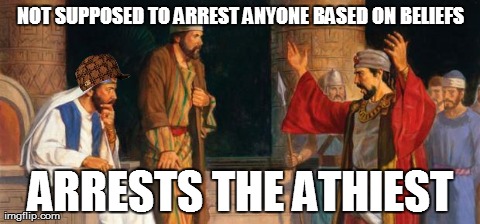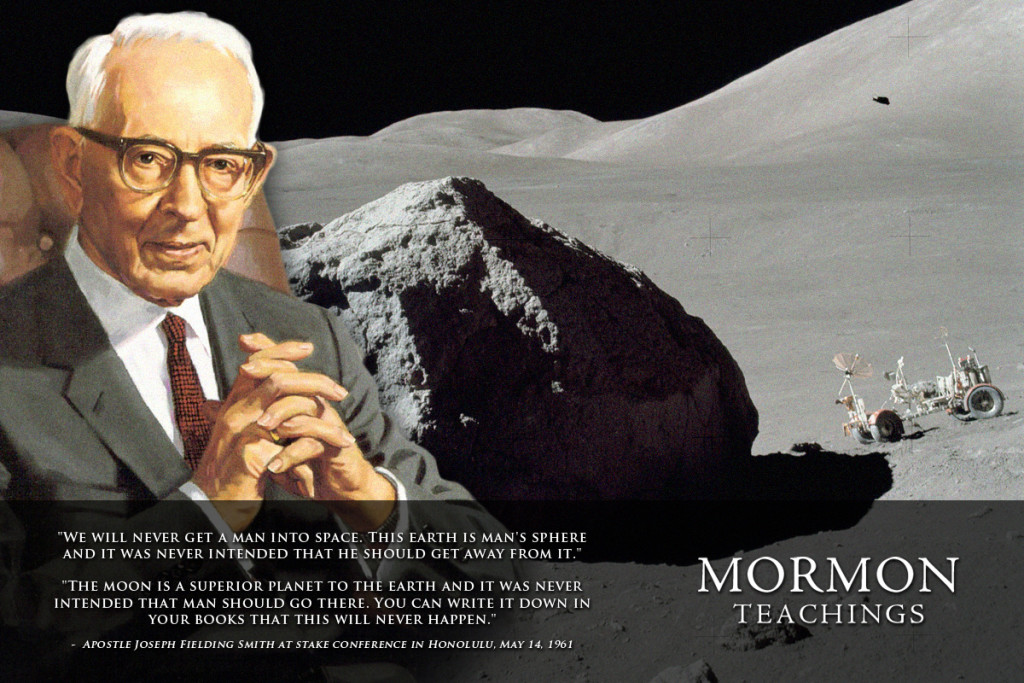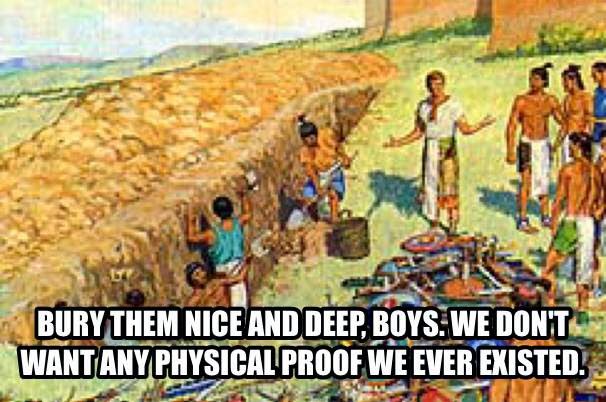“All Things Denote There Is a God”
Alma 30–31
LDS manual: here
Purpose
To show the poor reasoning in the LDS response to atheism, and that LDS arguments are designed to invalidate the experience of non-believers
Reading
This is one lesson that I’ve been looking forward to. It’s one of the interesting lessons, and it’s all because of Korihor — a character Joseph Smith wrote into the Book of Mormon. Aren’t the villains always the most interesting characters?
Korihor is a character from 1st century BCE Mesoamerica, but who for some reason sounds like a 19th-century Enlightenment-era atheist intellectual — the kind that Joseph Smith might have run across. Funny that.
Let’s get to the reading.
Korihor
Alma 30:5 And it came to pass that in the commencement of the seventeenth year of the reign of the judges, there was continual peace.
30:6 But it came to pass in the latter end of the seventeenth year, there came a man into the land of Zarahemla, and he was Anti-Christ, for he began to preach unto the people against the prophecies which had been spoken by the prophets, concerning the coming of Christ.
30:7 Now there was no law against a man’s belief; for it was strictly contrary to the commands of God that there should be a law which should bring men on to unequal grounds.
30:8 For thus saith the scripture: Choose ye this day, whom ye will serve.
30:9 Now if a man desired to serve God, it was his privilege; or rather, if he believed in God it was his privilege to serve him; but if he did not believe in him there was no law to punish him.
In Zarahemla, there’s no law saying you have to believe in a God, much like — ahem — modern America. Sounds great to me. I’m anti-Christ myself. And you shouldn’t get special privileges or different laws based on the religion you choose.
Let’s take a look at Korihor’s ideas. Are they quite good, or a cartoony idea of what atheists think? Let’s take a look.
Alma 30:12 And this Anti-Christ, whose name was Korihor, (and the law could have no hold upon him) began to preach unto the people that there should be no Christ. And after this manner did he preach, saying:
30:13 O ye that are bound down under a foolish and a vain hope, why do ye yoke yourselves with such foolish things? Why do ye look for a Christ? For no man can know of anything which is to come.
Not quite true. While there’s always some uncertainty about the future, there is something that allows us to make predictions: science.
Sometimes people challenge me on science — or as they’re fond of calling it, “scientism”. They have the idea that science is just one narrative, and it shouldn’t be privileged over other narratives. I’ve been asked: How do you know that science isn’t just one way of thinking that’s internally coherent, but which ultimately has nothing to do with the real world and relates only to itself?
My response: We know that science pertains to the real world because it allows us to predict the future. Or to use other words: by observing what we can of reality, we can make hypotheses that explain what we’re observing. Then we can use these hypotheses to predict future events. A good hypothesis is one that explains our observations, and which has predictive power.
Religions do not have a good track record when it comes to predicting the future. Here’s one of my favourite examples:
We will never get a man into space. This Earth is man’s sphere and it was never intended that he should get away from it.
The moon is a superior planet to the Earth and it was never intended that man should go there. You can write it down in your books that this will never happen.
Apostle Joseph Fielding Smith at Stake Conference in Honolulu, May 14, 1961
Oh, but he was just an apostle at the time. Why would expect him to know anything about that? You might as well ask the cat.
Alma 30:14 Behold, these things which ye call prophecies, which ye say are handed down by holy prophets, behold, they are foolish traditions of your fathers.
I think Mormon teachings are foolish traditions. I’m very grateful for the work of NewNameNoah, who has taken the LDS temple ceremonies, and exposed them to a wider audience. Mormons hate it — and I think that’s in part because they know that their ceremonies are ridiculous. They act like someone who feels silly because they’ve been caught doing something foolish.
I mean, who dresses like this?

One point for Korihor.
Alma 30:15 How do ye know of their surety? Behold, ye cannot know of things which ye do not see; therefore ye cannot know that there shall be a Christ.
Can you know of things that you don’t see? This was a question posed to me by a well-meaning bishop who came for a visit.
It depends on your definition of “know”. If you’re an intuitive type who thinks knowing means “believing very strongly”, then you might say yes.
But if you’re an empiricist — and empiricism is the bedrock of science — then you’d say that evidence has to be observable. Feelings are evidence of how you’re feeling — your internal state — but not for anything external, or outside yourself.
Alma 30:16 Ye look forward and say that ye see a remission of your sins. But behold, it is the effect of a frenzied mind; and this derangement of your minds comes because of the traditions of your fathers, which lead you away into a belief of things which are not so.
Frenzy and derangement are strong words. I prefer the term delusion — a fixed belief, contrary to fact.
Alma 30:17 And many more such things did he say unto them, telling them that there could be no atonement made for the sins of men, but every man fared in this life according to the management of the creature; therefore every man prospered according to his genius, and that every man conquered according to his strength; and whatsoever a man did was no crime.
Whoa — that’s not a good reflection of my views. I think whatsoever a man does is no sin. Crime is another matter.
I do think, however, that people should prosper according to their genius. Look at someone like Elon Musk, who’s using his intelligence and vision to change our system of transport and energy, taking us away from fossil fuels and into a future of renewable power. That’s a huge benefit to humankind.
Alma 30:18 And thus he did preach unto them, leading away the hearts of many, causing them to lift up their heads in their wickedness, yea, leading away many women, and also men, to commit whoredoms —
LOL — men too? That really is whoredoms.
Alma 30:18 …telling them that when a man was dead, that was the end thereof.
Does anyone have any evidence of a life after death? Not near-death experiences — they can be induced in people who aren’t near death.
And don’t even get me started on those books where a kid dies. (Click on the graphic for the full cartoon.)
Seriously, which story seems more straightforward to you?
To say nothing of the secret passwords and handshakes.
And how was Korihor’s teaching received? Not very well.
Alma 30:19 Now this man went over to the land of Jershon also, to preach these things among the people of Ammon, who were once the people of the Lamanites.
30:20 But behold they were more wise than many of the Nephites; for they took him, and bound him, and carried him before Ammon, who was a high priest over that people.
30:21 And it came to pass that he caused that he should be carried out of the land. And he came over into the land of Gideon, and began to preach unto them also; and here he did not have much success, for he was taken and bound and carried before the high priest, and also the chief judge over the land.
WTF? Even though the writer (presumably Alma) made a big deal out of saying that there was no law against a person’s belief, the minute someone says something contrary, they get tied up and ejected. Twice! And Alma comments on how wise this was, so he evidently approves.

Alma 30:22 And it came to pass that the high priest said unto him: Why do ye go about perverting the ways of the Lord? Why do ye teach this people that there shall be no Christ, to interrupt their rejoicings? Why do ye speak against all the prophecies of the holy prophets?
Here’s something that people say to skeptics: Why are you bothering us?
One night recently, I was outside a psychic event handing out bingo flyers.

You wouldn’t believe how easy this is. All you have to do is identify people who are attending the event, hand them a flyer, and say, “I hope you enjoy the show.” And they just take the flyers!
I know this sounds terrible, but there are two kinds of people at these events:
- groups of women aged 40–65, and
- isolated men who are being dragged along.
Men as a rule simply do not seem to go for the psychic mediums. If I ever tried to hand a bingo card to men, they’d say “Oh, I’m not actually going to that.” (Perhaps they were just embarrassed.)
Anyway, on this particular evening, a women saw what I was handing out, and we had this conversation:
Her: The thing is — Why do you care?
Me: Because I think people need to have good information when they’re making choices.
Her: It’s entertainment! It’s in a theatre.
Me: Well, if someone is just here for a bit of a laugh, then there’s probably no harm done. But if they’ve lost someone, and they’re hurting, and someone takes their money — they’re playing with something they shouldn’t.
Her: But we tell kids about Santa Claus and the Easter Bunny. It’s fun!
Me: I think people deserve informed consent.
Why do I care? I care about people having good information, and so should everyone.
Alma 30:23 Now the high priest’s name was Giddonah. And Korihor said unto him: Because I do not teach the foolish traditions of your fathers, and because I do not teach this people to bind themselves down under the foolish ordinances and performances which are laid down by ancient priests, to usurp power and authority over them, to keep them in ignorance, that they may not lift up their heads, but be brought down according to thy words.
Good for him — what else can we call it when humans claim authority over other humans because of some imaginary power?
Alma 30:24 Ye say that this people is a free people. Behold, I say they are in bondage. Ye say that those ancient prophecies are true. Behold, I say that ye do not know that they are true.
In an earlier lesson, I mentioned a time when someone asked me: what if I was wrong, and the church was true? What I didn’t say at the time was this: If somehow in a complete evidentiary vacuum, the church turned out to be true, God existed, and Jesus and everything was just as they say — even if despite all probability they guessed everything right — then Mormons do not know they’re right.
They don’t know they’re right. The only way you can be sure you’re right is by observation of publicly available reality and evidence. And it’s darn hard to know something even then! So if you’re not even doing that, what chance do you have of getting it right? As I’ve said before, there is no other way of knowing. And if you know another way, please tell me about it. (Mathematics might be a good answer. But even that needs some empirical backup to make sure the results apply to our universe.)
Alma 30:25 Ye say that this people is a guilty and a fallen people, because of the transgression of a parent. Behold, I say that a child is not guilty because of its parents.
Point goes to Korihor again. God unjustly punished Adam and Eve (so the story goes) because they committed an action before they knew right from wrong. Now we’re living in a world affected by their actions. The chapter never returns to this idea to answer Korihor’s criticism.
Alma 30:26 And ye also say that Christ shall come. But behold, I say that ye do not know that there shall be a Christ. And ye say also that he shall be slain for the sins of the world —
30:27 And thus ye lead away this people after the foolish traditions of your fathers, and according to your own desires; and ye keep them down, even as it were in bondage, that ye may glut yourselves with the labors of their hands, that they durst not look up with boldness, and that they durst not enjoy their rights and privileges.
30:28 Yea, they durst not make use of that which is their own lest they should offend their priests, who do yoke them according to their desires, and have brought them to believe, by their traditions and their dreams and their whims and their visions and their pretended mysteries, that they should, if they did not do according to their words, offend some unknown being, who they say is God — a being who never has been seen or known, who never was nor ever will be.
With a few exceptions, this depiction of rational atheism / skepticism is pretty good.
But Korihor gets hauled up before the authorities — for the third time! — for teaching his brand of hedonistic anti-clerical atheism.
Alma 30:29 Now when the high priest and the chief judge saw the hardness of his heart, yea, when they saw that he would revile even against God, they would not make any reply to his words; but they caused that he should be bound; and they delivered him up into the hands of the officers, and sent him to the land of Zarahemla, that he might be brought before Alma, and the chief judge who was governor over all the land.
…
Alma 30:37 And then Alma said unto him: Believest thou that there is a God?
30:38 And he answered, Nay.
30:39 Now Alma said unto him: Will ye deny again that there is a God, and also deny the Christ? For behold, I say unto you, I know there is a God, and also that Christ shall come.
No, you don’t. See above.
Alma 30:40 And now what evidence have ye that there is no God, or that Christ cometh not? I say unto you that ye have none, save it be your word only.
Alma is trying to turn the tables here. He’s saying “I say there’s a god, you say there’s no god; so it’s all a wash because all beliefs are equivalent.”
But it doesn’t work like that. Alma is shifting the burden of evidence. The burden of evidence rests with the claimant. Alma is the one claiming that a god exists, so it’s up to him to provide evidence for that claim. Watch out when people try to shift the burden of evidence. By asking Korihor for evidence that something doesn’t exist, Alma is asking him to prove a negative. It may not be possible to prove that gods (or leprechauns, or unicorns) don’t exist — when the concept of a god is not well-defined.
On the other hand, if the god in question is well-defined, and we fail to see the kinds of things we should be able to see if such a god exists, then we can say that absence of evidence is evidence of absence.
Neil deGrasse Tyson explains.
That doesn’t mean that believers aren’t creative when it comes to shifting the goalposts, as James Randi points out.
Alma continues:
Alma 30:41 But, behold, I have all things as a testimony that these things are true; and ye also have all things as a testimony unto you that they are true; and will ye deny them? Believest thou that these things are true?
30:42 Behold, I know that thou believest, but thou art possessed with a lying spirit, and ye have put off the Spirit of God that it may have no place in you; but the devil has power over you, and he doth carry you about, working devices that he may destroy the children of God.
This is one of the really annoying things believers say: I think you really do believe, even though you claim not to.
My response is: How about I tell you what I believe.
Now Korihor makes a perfectly reasonable request: Show me the evidence.
Alma 30:43 And now Korihor said unto Alma: If thou wilt show me a sign, that I may be convinced that there is a God, yea, show unto me that he hath power, and then will I be convinced of the truth of thy words.
30:44 But Alma said unto him: Thou hast had signs enough; will ye tempt your God? Will ye say, Show unto me a sign, when ye have the testimony of all these thy brethren, and also all the holy prophets? The scriptures are laid before thee, yea, and all things denote there is a God; yea, even the earth, and all things that are upon the face of it, yea, and its motion, yea, and also all the planets which move in their regular form do witness that there is a Supreme Creator.
Here, Alma shows that he does not understand the kind of evidence that is required to support a claim. He does this in two ways:
- He claims that words written by prophets in holy books counts as evidence. It does not. The people who wrote those books could have been mistaken, dishonest, or insane. And if we do allow scriptures as evidence, then whose? The Bible? The Quran? The Bhagavad-Gita? They’re all mutually contradictory. Picking one and not another is just special pleading — claiming that one set of scriptures is “different” somehow, but not saying why. Finally, you can’t use scriptures as evidence for a claim. They’re not evidence — they’re the claim. They need their own evidence.
- He claims that the earth and the planets are evidence. (This is what I call the “look around” defence, because a young missionary once told me exactly that when I asked him for evidence: Look around!) The earth and the planets are only evidence if we presuppose that a god made them. But there are other explanations that don’t require us to believe in a magical being. This is a big problem for believers: there are better explanations for the kinds of things people cite as evidence.
Korihor pivots a little bit. Perhaps he realises that it’s difficult to prove a negative, so he says:
Alma 30:48 Now Korihor said unto him: I do not deny the existence of a God, but I do not believe that there is a God; and I say also, that ye do not know that there is a God; and except ye show me a sign, I will not believe.
At this, Alma has had enough.
Alma 30:49 Now Alma said unto him: This will I give unto thee for a sign, that thou shalt be struck dumb, according to my words; and I say, that in the name of God, ye shall be struck dumb, that ye shall no more have utterance.
30:50 Now when Alma had said these words, Korihor was struck dumb, that he could not have utterance, according to the words of Alma.
At this point, it looks like God is frustrated enough to harm Korihor. He doesn’t take call-outs well. On the other hand, while Korihor’s sudden muteness could be taken as evidence of God’s existence (and peevishness), there are other explanations. He could have gotten sudden laryngitis or had a stroke. An evil god could have taken his voice. When it comes to supernatural explanations, one is as untestable as another.
Alma 30:51 And now when the chief judge saw this, he put forth his hand and wrote unto Korihor, saying: Art thou convinced of the power of God? In whom did ye desire that Alma should show forth his sign? Would ye that he should afflict others, to show unto thee a sign? Behold, he has showed unto you a sign; and now will ye dispute more?
The chief judge is a bit of a dope; why is he writing? He can speak.
Having forfeited its believability, the story now descends into farce.
Alma 30:52 And Korihor put forth his hand and wrote, saying: I know that I am dumb, for I cannot speak; and I know that nothing save it were the power of God could bring this upon me; yea, and I always knew that there was a God.
30:53 But behold, the devil hath deceived me; for he appeared unto me in the form of an angel, and said unto me: Go and reclaim this people, for they have all gone astray after an unknown God. And he said unto me: There is no God; yea, and he taught me that which I should say. And I have taught his words; and I taught them because they were pleasing unto the carnal mind; and I taught them, even until I had much success, insomuch that I verily believed that they were true; and for this cause I withstood the truth, even until I have brought this great curse upon me.
That’s right, folks; Korihor believed in God the whole time. And this is what believers need to think: that critics are secret believers, really. We’re just lying when we say we don’t believe. And we’re literally influenced by the devil.
What a disservice. For believers, not only is there no legitimate reason not to believe, non-believers shouldn’t be trusted when they say they don’t. Maybe believers need to think this because the prospect of a real honest-to-goodness unbeliever with real honest-to-goodness reasons is way too threatening. If there are reasons, then maybe they should stop believing too — and that would mean loss of social group, loss of family, loss of identity, and loss of investment. That would take change, work, and self-analysis. Who wants to do that? And so believers take the lazy way out.
They don’t seem to notice that unbelievers never suddenly go mute. Instead, our voices are growing.
Well, that’s the end for old Korihor, except for his untimely end. Unable to answer his claims, God simply dispenses with him.
Alma 30:58 And it came to pass that they were all convinced of the wickedness of Korihor; therefore they were all converted again unto the Lord; and this put an end to the iniquity after the manner of Korihor. And Korihor did go about from house to house, begging food for his support.
30:59 And it came to pass that as he went forth among the people, yea, among a people who had separated themselves from the Nephites and called themselves Zoramites, being led by a man whose name was Zoram — and as he went forth amongst them, behold, he was run upon and trodden down, even until he was dead.
30:60 And thus we see the end of him who perverteth the ways of the Lord; and thus we see that the devil will not support his children at the last day, but doth speedily drag them down to hell.
That’s confirmation bias there. Some of us do quite well, post-deconversion. But if anything ever did happen to me, I’m sure the dear old ward members would think of this chapter of Alma and infer some kind of judgment.
The Rameumptom
And then there’s a pretty humourous description of the Zoramites and their Rameumptom. Doesn’t that name sound like something Roald Dahl might have made up?
Alma 31:12 Now, when they had come into the land, behold, to their astonishment they found that the Zoramites had built synagogues, and that they did gather themselves together on one day of the week, which day they did call the day of the Lord; and they did worship after a manner which Alma and his brethren had never beheld;
31:13 For they had a place built up in the center of their synagogue, a place for standing, which was high above the head, and the top thereof would only admit one person.
31:14 Therefore, whosoever desired to worship must go forth and stand upon the top thereof, and stretch forth his hands towards heaven, and cry with a loud voice, saying:
31:15 Holy, holy God; we believe that thou art God, and we believe that thou art holy, and that thou wast a spirit, and that thou art a spirit, and that thou wilt be a spirit forever.
31:16 Holy God, we believe that thou hast separated us from our brethren; and we do not believe in the tradition of our brethren, which was handed down to them by the childishness of their fathers; but we believe that thou hast elected us to be thy holy children; and also thou hast made it known unto us that there shall be no Christ.
31:17 But thou art the same yesterday, today, and forever; and thou hast elected us that we shall be saved, whilst all around us are elected to be cast by thy wrath down to hell; for the which holiness, O God, we thank thee; and we also thank thee that thou hast elected us, that we may not be led away after the foolish traditions of our brethren, which doth bind them down to a belief of Christ, which doth lead their hearts to wander far from thee, our God.
31:18 And again we thank thee, O God, that we are a chosen and a holy people. Amen.
31:19 Now it came to pass that after Alma and his brethren and his sons had heard these prayers, they were astonished beyond all measure.
31:20 For behold, every man did go forth and offer up these same prayers.
31:21 Now the place was called by them Rameumptom, which, being interpreted, is the holy stand.
31:22 Now, from this stand they did offer up, every man, the selfsame prayer unto God, thanking their God that they were chosen of him, and that he did not lead them away after the tradition of their brethren, and that their hearts were not stolen away to believe in things to come, which they knew nothing about.
31:23 Now, after the people had all offered up thanks after this manner, they returned to their homes, never speaking of their God again until they had assembled themselves together again to the holy stand, to offer up thanks after their manner.
Assign two class members to read the following story.
The first time I saw it was in the venerable Student Review which operated out of BYU in the early 90s. Any information about the author would be welcome.
Cast: A father and his daughter.
“What’s a Rameumptom, Daddy?”
“Well, the Book of Mormon says it was a place where the Zoramites stood to worship and pray.”
“But my Primary teacher said it was a tower that evil people used.”
“I can see how someone could think that. The Book of Mormon says it was a place for standing which was high above the head’ and only one person at atime could go up there.”
“Was it like the speaker’s stand in the church?”
“A speaker’s stand? You mean a pulpit? Yes, I suppose it was. In fact, the word ‘Rameumptom’ means ‘the holy stand.'”
“What’s so evil about a holy stand, Daddy?”
“Well, it wasn’t the stand that was evil. It was how it was used. The people gathered there in their synagogue. . .”
“What’s a synagogue?”
“Just a different word for chapel or church, honey.”
“Oh.”
“They’d gather in their synagogue one day a week.”
“Which day, Daddy?”
“I don’t know, honey. It just says ‘one day,’ and they called it ‘the day of the Lord.'”
“It must have been Sunday.”
“Why do you say that?”
“Because Sunday is the Lord’s day.”
“Well, maybe it was. . . Anyway, they’d gather there and whoever wanted to worship would go and stand on the top of the Rameumptom.”
“Could anyone go up there?”
“Well, no, that was part of the problem. Apparently, they had to wear the right clothes. . . ”
“You mean like us when we wear Sunday clothes, Daddy?”
“Well, not exactly, but in a way, yes, I suppose. Some of us might have a hard time accepting certain kinds of clothes or people in sacrament meeting. But we wear our Sunday clothes to help us be reverent, don’t we?”
“Yes, Daddy.”
“So anyway, where was I?”
“They went to the top of the Rameumptom. . .”
“Yes, they would go up and worship God by thanking him for making them so special.”
“Were they bearing their testimonies?”
“Well, uh, I guess maybe they were in a way, but they weren’t true testimonies.”
“How come?”
“Because they were too proud.”
“What do you mean ‘proud,’ Daddy?”
“Well, they would talk about how they were ‘a chosen and holy people.'”
“My Primary teacher said Mormons are the chosen people and we’re a special generation.”
“Yes, honey, but that’s different.”
“How?”
“Because we are.”
“Oh.”
“Besides they were very, very proud about how much better they were than everyone else, because they didn’t believe the ‘foolish traditions’ of their neighbors.”
“What does that mean, Daddy?”
“It means that they believed everyone else was wrong and they alone were right.”
“Isn’t that what we believe?”
“But it’s different.”
“How?”
“Because we are right, honey.”
“Oh.”
“Everyone would stand and say the same thing. . .”
“That sounds like testimony meeting to me.”
“Don’t be irreverent.”
“Sorry.”
“Then after it was all over, they would go home and never speak about God until the next day of the Lord when they’d gather at the holy stand again.”
“Isn’t that like us, Daddy?”
“No honey, we have Family Home Evening.”
“Oh.”








Recent Comments